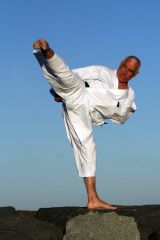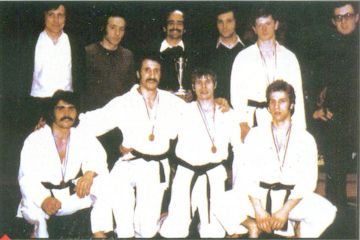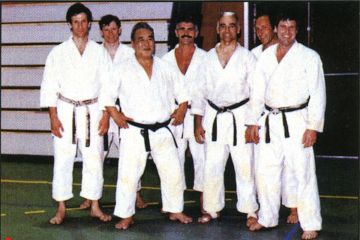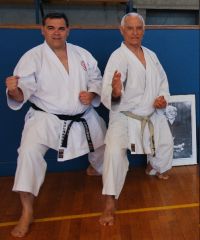Shihan Jean-Pierre Lavorato, 9th Dan France
Chief Instructor International Karate Academy
Conducted by Pascal Petrella, 6th Dan KSKA, Germany
The interview took place on the 25th of February 2012 in Müllheim, Germany at a seminar with Shihan Jean-Pierre Lavorato. Shihan Lavorato is one of the Karate pioneers in France and one of the first and closest students in Europe of the late sensei Taiji Kase, 9th Dan.
PP: When and where were you born?
JPL: I was born on 30th July 1944 at a suburb of Paris called Vitry-Châtillon, south of Paris.
PP: When and how did you first time get in touch with karate and who were your first karate teachers?
JPL: I started to practice karate in the age of 18 years, in 1963. I was actually practicing gymnastics and one day our gymnastics instructor, he was a black belt in karate, asked us if we would like to start karate. All my friends in gymnastics said yes, but at the next training I was the only one who turned up. So for one year I was the only student of Mr. Pierre Mercier, he is now 82 years old and still practicing karate. After one year he suggested to me, that I should go to Paris to practice with his teacher Henry Plee. My first teachers at that time where than Mr. Henry Plee, Mr. Nambu and Patrik Baroux.
PP: How was the training like in the 60ies compared with training today?
JPL: Oh we practiced a lot of kihon, kata, sanbon-kumite, gohon-kumite and jiyu-ippon-kumite. The training was very simple compared with today, but very hard. Quite often we did for instance 1000 mae-geris or things like that, to automate our technique and to harden our spirit.
PP: Who where you training partners in the 60ies?
JPL: My training partners were Patrick Baroux, my best friend Dominic Valera, Mr. Desnocs, Francis Didier, he is now the President of the France Karate Federation, Mr. Bahu the teacher of Francis Didier.
PP: You competed in mid 60ies already, how was the training like and what was your achievement at competition karate?
JPL: The first competition I took part was in 1964. At that time we practiced all techniques, Kihon, Kata, Kumite, and maybe only two months before the competition we had a special training for that event. In that time we had not much rules in kumite competition. To make contact at the face or at the body was ok, as long as there was no blood. And when somebody was bleeding, the referee said please be more careful. At the first championship in 1964 I was French Kata Champion. In 1966 I was European Champion in Team Kumite along with Dominique Valera, Patrick Baroux, Descnocs, and Guy Sauvin. We also won in 1966 the European Cup in Cannes against the Netherlands (Valera, Baroux, Bonnin, Bahu, Lavorato). And in 1968 I was France Champion in Kumite open category. And with the Team of Henry Plee's Dojo (Academy France Arts Martiaux) we won 5 times French Kumite Team Champions and 5 times French Cup in Team Kumite.
PP: Do you think sports karate is important for the development of a karateka, if yes what did you gain from competition?
JPL: I think for younger people competition is very good, they like also the confrontation. They can learn to control their emotions, their tension through the pressure during a competition. At competitions you must face and adapt different partners, some are tall, some are small, some are very aggressive, some have a very defensive tactic and competitors must learn to cope with this pressure. Competition is good to learn timing. But street fighters have also good timing, be careful. Many people think because they are a champion they are strong, but on the streets are no rules (laugh...)
In my time at the old style Ippon Kumite and Jiyu Ippon Kumite, Zanshin was very important, because we had no protections, and when you didn't take care of yourself, you could be seriously injured. Control at that time was when the opponent was not injured. There was no chui for uncontrolled technique and a reward (Wazari or Ippon) for the one who got hit (laugh). It was more reality at that time.
PP: Against whom did you have your toughest fight?
JPL: Against my very best friend Dominique Valera. I know him for a very long time. We even went in 1966 together to Japan.
PP: When did you meet sensei Taiji Kase first?
JPL: I met him first at our visit to Japan in 1966 at the JKA Honbu Dojo in Ebisu at the entrance. He was very gentle, very kind, very simple. One year later Henry Plee wrote a letter to Mr. Shirai to invite him to teach in Paris. But he said it is impossible for him to come, because he is very much occupied in Italy, but he recommended to invite sensei Kase, the European JKA Chief Instructor at that time. Well, when he came the first time in 1967 to Paris I picked him up from Lyon train station where he arrived from Italy.
PP: What was your impression when you met sensei Kase and practiced with him when he came to Paris in 1967.
JPL: First of all Revelation. When he got aware of the fact, that I was competing and winning against karateka from other styles he was of course proud and asked me to continue in order to make Shotokan famous.
But with sensei Kase I experienced another "face of the diamond". I practiced with him for 39 years. He was able to adapt to any situation and person. He had a very open mind, and he was open to everybody.
Sensei Kase's kicks were exceptionally strong. He liked to kick the bag or makiwara. In the beginning he even kicked a hole in a punching bag, we all were very impressed. I also love to kick the bag or makiwara. He also liked practice long distance attacks with a punch or a kick over 3 to 5 meters!
PP: 3-5 meters how did he do that?
JPL: He just did it with maximum speed and power. He was incredible. And some of his training sessions were incredible, too. One time I came to the dojo and we did 70 times Kanku-dai. Yoi hajime - yame - yoi hajime yame. We were all very kaputt after! (laugh)
PP: What kind of training did he conduct in the 60ies?
JPL: He teached many techniques, like kicks with the same leg mae-geri, mawashi-geri, yoko-geri, ushiro-geri. He liked combinations. His focus was not 5-5-5 like we know it from JKA, he did that only sometimes. He did also kata with some of his applications with a reality approach. But we did not perform kata ura or go or ura-go at that time.
PP: When did sensei Kase start to do kata ura, go and ura-go?
JPL: I think he started to do ura-kata, go-kata and ura-go-kata in the period of 1975/1976 something like that. He also started at that time with Gyaku-Uraken. And I think he started with open hands techniques at the beginnings of the 80ies. I think also that the practiced this thinks for himself much earlier.
PP: Did you follow sensei Kase regularly or have there been any cuts in your relationship?
JPL: I practiced with sensei Kase from 1967 until he died in November 2004. In 1975 I had some problems with Camille Daudier (he was like an assistant to sensei Kase), like many people in France. He helped sensei Kase with some personal things and after that sensei Kase was very loyal to him. He didn't allow me to practice with sensei Kase. But behind Daudiers back sensei Kase asked me to come to him for personal trainings (laugh). Since I have met sensei Kase, I never practice or studied karate with another sensei, because in my opinion nobody could match him. During this time I always visited him at his home in Paris and very often it took only 5 minutes and we pushed the tables and chairs in his living room aside and sensei Kase asked me to show him my research, my progress. But not with the Gi, that was in jeans and sweat-shirt. Often I showed him one application of a kata and he said oh very good, but after he showed me 5 other applications, it was like a game we had. He was a very experienced master and very often he didn't say anything, only when you asked him, than he gave you and advice. At a time I had some problems with Fudo-dachi. I had pain at my tendons groin area. Maybe my position was to much back. Hence sensei Kase adviced me to shift my center of gravity a bit forward. And after a while my pain was gone. I guess, I was very lucky, because he liked me. And I just loved sensei Kase.
PP: What do you think was sensei Kases biggest strength?
JPL: (Pause) Difficult to explain. He was very different than any other Japanese Instructor I have ever met in my life. Sometime I think he was not a normal human, because he practiced in another dimension. For him everything was possible, there are no limits for your body and mind. For me he was the most advanced karate I have ever met. In the dojo he was very strong, explosive and powerful, in life he was very kind and humble.
PP: When sensei Kase got seriously sick in 2003 you also very helpful to sensei Kase and his family?
JPL: When he was sick I visited him many times, nearly every week. And of course we always talked about karate. He could only sit in the chair, but nevertheless he didn't stop thinking about karate and how to get power and practice karate, sitting in a chair; open hands, uraken, zukis.
PP: (laugh) Yes I had exactly the same experience at sensei Kase's home.
PP: Jean-Pierre, with nearly 71 years of age and nearly practicing 50 years karate-do, what is in your opinion the most important thing to do, to be as fit as you?
JPL: Continue to practice karate every day. For non-professionals practice regularly 2-3 times a week or as much as you can, but never stop practice karate. If you have no much time due to a heavy job or family obligations, it is not necessary that you go to the dojo to practice. You can practice everywhere at home, in the hotel 10 minutes a day with 24 hours should be possible. No time is in my opinion no excuse. Some techniques every day is possible for everybody, it is also important for your mind. Even if you have some health problems, some physical problems just continue, slowly but consciously. Continue to practice karate, with reflection, not like a horse with blinker.
For me, it doesn't matter what happens I will always go my way. As my son was born, I was at the dojo, and after the training I went to visit my wife and my newborn son. Some people think I might be creasy, but that is the way I am. I respect other thinks, but I go my way. One has to find his own balance in life, family, job, karate, life, but just continue to practice karate.
PP: Sensei Lavorato thank you very much for this open interview and for your time. All the best, good health and many more years for you to do your research in Karate-do the Kase-ha way.
JPL: You are very welcome, thank you.






